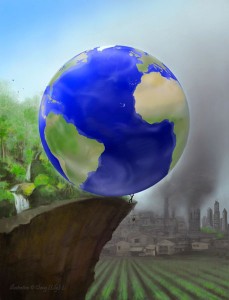Does Anyone Care that 500 Scientists Think the Earth is at a Tipping Point?
May 23rd, 2013 | By admin | Category: Climate ChangeBy Suzanne York, www.howmany.org
At a conference in Silicon Valley, a consensus statement signed by over 500 of the world’s top global scientists was publicly released. It outlines the main environmental issues – from climate change to pollution and population growth – that policy makers must address immediately to avoid an approaching global tipping point.
The scientists are concerned that “human impacts are causing alarming levels of harm to our planet.” The biggest impacts include:
- Climate disruption—more, faster climate change than since humans first became a species.
- Extinctions—not since the dinosaurs went extinct have so many species and populations died out so fast, both on land and in the oceans.
- Wholesale loss of diverse ecosystems—we have plowed, paved, or otherwise transformed more than 40% of Earth’s ice-free land, and no place on land or in the sea is free of our direct or indirect influences.
- Pollution—environmental contaminants in the air, water and land are at record levels and increasing, seriously harming people and wildlife in unforeseen ways.
- Human population growth and consumption patterns—seven billion people alive today will likely grow to 9.5 billion by 2050, and the pressures of heavy material consumption among the middle class and wealthy may well intensify.
There have been other similar statements signed by scientists in the past. This particular one came as a result of a query by California governor Jerry Brown on why scientists are not “translating their findings into terms that policy makers, industry and the general public can understand.” Certainly it makes sense to change the approach, as nothing is happening on the national policy front and climate impacts are becoming more and more severe.
The full statement has been signed by 520 global scientists from 44 countries. They offer what they call “broad-brush solutions” in the short statement. In terms of population growth and consumption, these are two of the biggest pressures facing the planet, and which can aid in easing the other problems if properly and positively addressed. Specifically, the scientists support a target of 8.5 billion people by 2050 and a peak population size of “no more than 9 billion, which can decrease to less than 7 billion by 2100.” The United Nations predicts an increase between 9 and 10 billion by 2050.They offer a rights-based approach for stabilizing population, asserting that “Viable approaches include ensuring that everyone has access to education, economic opportunities, and health care, including family planning services, with a special focus on women’s rights.”
As for the need to reduce consumption, a huge challenge for developed nations, the statement calls for “improving efficiency in production, acquisition, trade, and use of goods and promoting environmentally-friendly changes in consumer behavior.”
Obviously these are enormous problems that too many policy makers are reluctant or opposed to tackle. This is an effort to kickstart discussing and implementing sound policies, especially in polarized Washington, DC. The big question is will they hear the scientists’ plea, and more importantly, will they care and do something about it?
The time to act is now. The statement ends with a commonsense appeal: “For humanity’s continued health and prosperity, we all - individuals, businesses, political leaders, religious leaders, scientists, and people in every walk of life - must work hard to solve these five global problems, starting today.”
Suzanne York is a senior writer with the Institute for Population Studies.

